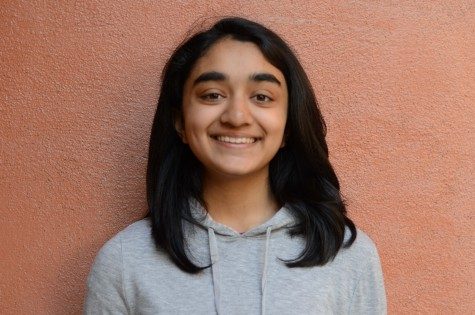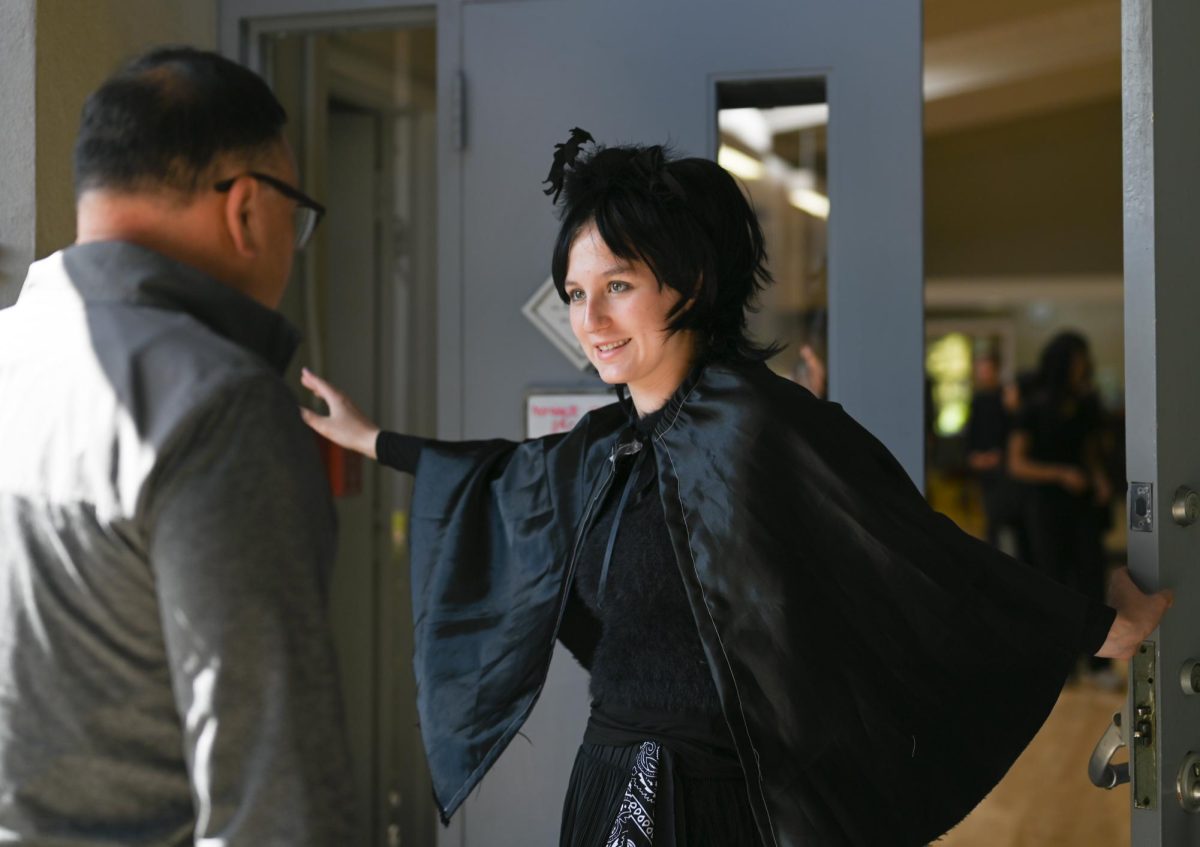CHWYM: Trump administration rolls back DACA program (Volume 19, Issue 2)
October 12, 2017
Franco Vidal, a sophomore at California State University Northridge studying film, checked his phone during a meeting on Sunday, Sept. 5. He saw a news alert on his phone, and disorientation set in.
“I really didn’t know where I was or what was going on or what was happening,” he said. “But at the same time, I had already been through so much and seen so much; [I] was almost kind of [unfazed] at that initial moment. It was very much, ‘you did it.’ What did you expect from our most unpredictable and controversial president?”
President Trump had just announced that his administration will bring an end to the Deferred Action for Childhood Arrivals (DACA) program, calling on Congress to enact immigration reform as a substitute to DACA’s protections before they begin expiring in March 2018.
Vidal is undocumented, having been born in Lima, Peru, and arrived in the U.S. in winter 2003. He received DACA status in Sept. 2015, the fall of his senior year in high school.
Existing DACA beneficiaries will keep their status for now, and those whose protections were set to run out during or before March 2018 were given a one-month window, which ended Oct. 5, to submit a renewal application to extend their deportation protection by two years.
All applications still pending at the time of the announcement on Sept. 5 were still considered, but no renewal applications from any DACA members will be accepted after Oct. 5, and all DACA protections will phase out by October 2019.
DACA gives temporary protection from deportation to around 800,000 undocumented migrants between the ages of 15 and 31 who were brought to the U.S. as children. President Obama began the program as an executive policy action in 2012. President Trump has authority to end the program since it was not part of an act passed by Congress.
“In the days before the initial announcement came out, community members were waiting hour by hour to see if the announcement was gonna come out [and] what exactly it was gonna be,” said Priya Murthy, Policy and Advocacy Director at Services, Immigrant Rights, and Education Network (SIREN) in San Jose. SIREN advocates for immigration policy reform and provides legal services to DACA beneficiaries and other immigrants.
In the month between the announcement of the repeal and the deadline for application renewal, SIREN held free legal clinics for DACA consultation almost daily.
“[The repeal] also has a serious impact on how an organization [like SIREN] can prepare, has serious impacts on families and community members in terms of what their futures mean, and also has an impact on the mental health of the people wondering what their lives are going to be like over the whim of what Trump felt like on a particular day,” she said.
To receive protection under DACA, applicants must meet several requirements: they have to receive a background check for any criminal history, undergo a vetting process to ascertain they are not threats to national security, must be in school or have completed school or military service, have to have lived in the U.S. continuously for five years and have arrived under the age of 16 and must renew their DACA status every two years.
“I don’t even know the rules of how my renewal status will apply in a non-DACA world,” Vidal said. “Come any situation that the police will come find me and ask for my status, and I show them my DACA card and identification– any sort of miscommunication or misinformation, they could tell me that that’s not applicable when it very much is, or maybe it isn’t. I don’t know. There’s still very much confusion about everything that’s going on.”
DACA recipients and applicants come from around the world, though most focus centers around the 75% of undocumented immigrants who are Latino. About 14 percent of undocumented immigrants to the U.S come from Asia, and 10 percent of undocumented immigrants eligible for DACA are of Asian background.
“There is a lack of understanding about diversity of the undocumented population, so definitely because of 75% of the undocumented population is Latino, it makes a lot of sense that a lot of our understanding and our scholarship is about the Latino population,” said Esther Cho, a PhD Candidate in the Department of Sociology at University of California, Berkeley, who is researching how race affects the experience of being undocumented. “When it comes to DACA, people have been wondering why there is such a low application rate with our Asian population. One of the potential reasons why that might be happening is a lack of awareness and a lack of access.”
Shine Cho (of no relation to Esther Cho) is a junior at University of California, San Diego, studying political science. She is an undocumented student and has been part of the DACA program since she was 16, having arrived in the U.S. when she was just under two years old.
“When I got into college and started applying to internships with companies that required social security numbers and needed official documentation, it was because of DACA I was able to apply to these things. My first summer of college, going into my second year, I landed an internship with CBS News in Los Angeles, and I did investigative reporting. I was one of two interns in this unit,” Cho said. “DACA has been really integral in my life just for being able to pursue these opportunities that are so important as a supplement to my college education. Work experience is super important and being able to work is probably the most important, and DACA has really allowed me to go after everything.”
The City of San Jose joined the District of Columbia and 16 states, including California, in both suing the Trump administration over DACA’s end and supporting DREAMers.
“The Attorney General’s announcement of the Trump Administration’s rescission of DACA abandons 800,000 of America’s hardest-working, most patriotic residents,” San Jose Mayor Sam Liccardo said in a press release. “Punting the issue to Congress, without any affirmative leadership to enact a legislative solution, amounts to a cowardly cop-out, placing the futures of these young women and men in serious jeopardy. To San Jose’s tens of thousands of DREAMers, we reiterate: ‘We’ve got your back.’”
“This country is where my contribution belongs to, where my efforts and goals go to, just like any other,” Vidal said. “We don’t want DACA status; it’s helped a ton, and it’s been probably the best thing to enter our lives since entering this country and yet, even during the Obama administration, there was fear and a sense of hopelessness and depression and wondering when it will all end?
“[DACA] is good and everything, but it simply isn’t good enough, at least not in the eyes of others, at least not enough to put their prejudice away or to help me sleep at night thinking that maybe today I’ve done a good job, maybe I’m not a criminal today.”
This piece was originally published in the pages of the Winged Post on October 12, 2017.


















![“[Building nerf blasters] became this outlet of creativity for me that hasn't been matched by anything else. The process [of] making a build complete to your desire is such a painstakingly difficult process, but I've had to learn from [the skills needed from] soldering to proper painting. There's so many different options for everything, if you think about it, it exists. The best part is [that] if it doesn't exist, you can build it yourself," Ishaan Parate said.](https://harkeraquila.com/wp-content/uploads/2022/08/DSC_8149-900x604.jpg)




![“When I came into high school, I was ready to be a follower. But DECA was a game changer for me. It helped me overcome my fear of public speaking, and it's played such a major role in who I've become today. To be able to successfully lead a chapter of 150 students, an officer team and be one of the upperclassmen I once really admired is something I'm [really] proud of,” Anvitha Tummala ('21) said.](https://harkeraquila.com/wp-content/uploads/2021/07/Screen-Shot-2021-07-25-at-9.50.05-AM-900x594.png)







![“I think getting up in the morning and having a sense of purpose [is exciting]. I think without a certain amount of drive, life is kind of obsolete and mundane, and I think having that every single day is what makes each day unique and kind of makes life exciting,” Neymika Jain (12) said.](https://harkeraquila.com/wp-content/uploads/2017/06/Screen-Shot-2017-06-03-at-4.54.16-PM.png)








![“My slogan is ‘slow feet, don’t eat, and I’m hungry.’ You need to run fast to get where you are–you aren't going to get those championships if you aren't fast,” Angel Cervantes (12) said. “I want to do well in school on my tests and in track and win championships for my team. I live by that, [and] I can do that anywhere: in the classroom or on the field.”](https://harkeraquila.com/wp-content/uploads/2018/06/DSC5146-900x601.jpg)
![“[Volleyball has] taught me how to fall correctly, and another thing it taught is that you don’t have to be the best at something to be good at it. If you just hit the ball in a smart way, then it still scores points and you’re good at it. You could be a background player and still make a much bigger impact on the team than you would think,” Anya Gert (’20) said.](https://harkeraquila.com/wp-content/uploads/2020/06/AnnaGert_JinTuan_HoHPhotoEdited-600x900.jpeg)

![“I'm not nearly there yet, but [my confidence has] definitely been getting better since I was pretty shy and timid coming into Harker my freshman year. I know that there's a lot of people that are really confident in what they do, and I really admire them. Everyone's so driven and that has really pushed me to kind of try to find my own place in high school and be more confident,” Alyssa Huang (’20) said.](https://harkeraquila.com/wp-content/uploads/2020/06/AlyssaHuang_EmilyChen_HoHPhoto-900x749.jpeg)










